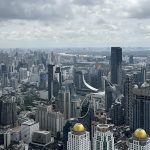Thai economy grew 3.2% in final quarter
Reading Time: 2 minutesThailand’s economy grew 3.2% year-on-year in the fourth quarter of 2024, falling short of projections, as sluggish private investment and slower government spending weighed on growth.
Analysts warn that trade tensions and global uncertainties could pose further challenges in 2025, prompting calls for government stimulus measures to sustain economic momentum.
Official data from Thailand’s National Economic and Social Development Council (NESDC) showed growth below the 3.9% forecast by news agency Reuters.
While Thailand’s economy showed signs of acceleration from earlier in the year, the pace remained slower than other Southeast Asian (SEA) economies.
Full-year GDP growth was 2.5%, also below expectations, with analysts citing weak exports, sluggish domestic consumption, and high household debt as drags on the economy.
Gov’t stimilus measures to make Thailand finance hub
Thai Prime Minister Paetongtarn Shinawatra has called for greater coordination between the government and the Bank of Thailand to support economic growth, emphasising the need for both fiscal and monetary policy to work in tandem.
Her government is introducing new policies to promote Thailand as a financial hub and to support eight key sectors, including banking, payment services, and securities trading. Regulators are also tightening digital finance oversight, with new guidelines expected for the rapidly expanding buy now, pay later market, which is seeing strong demand amid shifting consumer preferences.
Thai economists broadly want additional stimulus measures, as external trade risks threaten growth prospects in 2025; as key aspects such as exports, tourism and foreign investment are all vulnerable to global downturns and geopolitical shifts.
The NESDC projects Thailand’s GDP to grow by 2.8% in 2025, with public infrastructure investment and recovering private consumption driving expansion. The agency meanwhile warned of uncertainties around US trade policy and slowing demand from key markets, however.
Trump adds to uncertainty around electronic, auto, agro
The Trump administration’s approach to tariffs and bilateral trade agreements could affect Thai exports, particularly in electronics, auto parts, and agriculture.
Additionally, China’s economic slowdown poses risks to tourism, a key driver of Thailand’s post-pandemic recovery, as Chinese tourists are spending below pre-2020 levels.
To counter these, the NESDC has outlined several economic resilience strategies, including expanding public investment in infrastructure projects, enhancing trade agreements to diversify export markets, supporting digital transformation and innovation-driven industries, and boosting domestic consumption through targeted social and economic policies.
While Thailand’s economy is expected to grow by 2.8% in 2025, policymakers face a delicate balancing act between maintaining fiscal discipline and ensuring sufficient economic stimulus. The government’s ability to navigate global economic volatility, trade disputes, and geopolitical risks will be crucial in shaping Thailand’s economic trajectory in the coming year.
Delta Electronics stock crash cautionary tale
Thailand’s tech and manufacturing sectors are also adjusting to global trade shifts. The Digital Economy Promotion Agency is positioning Thailand as a potential IT manufacturing hub, with US tariff policies creating new opportunities for local producers.
However, investor sentiment remains fragile, as demonstrated by the sharp 30% decline in Delta Electronics Thailand’s stock, which erased USD 12bn in market value amid broader market pessimism.
The Thai government is also exploring regulated casinos, with proposals to implement strict safeguards for local gamblers. Meanwhile, the Airports of Thailand Public Company has disclosed that private sector operators owe THB 5bn in outstanding payments, prompting new measures to ensure compliance with contractual obligations.
Thailand’s economic stability will depend on balancing financial sector reforms, trade policy adjustments, and investor confidence. Policymakers are expected to focus on debt restructuring measures and targeted industry support to navigate an increasingly complex global economic environment.

